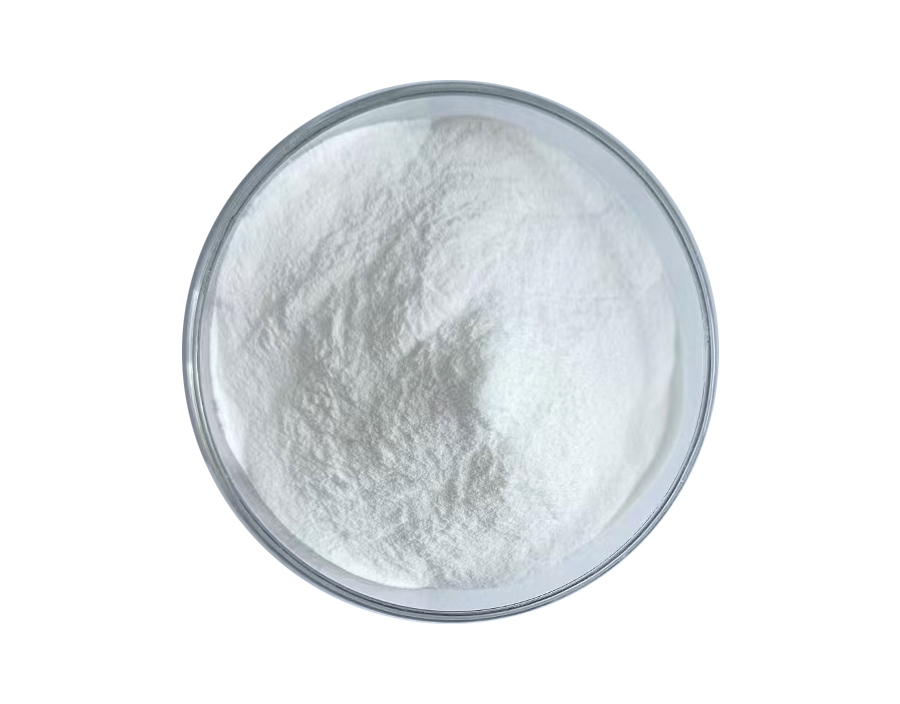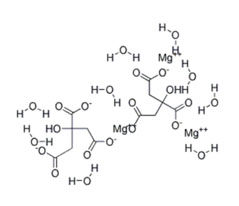
CAS NO.: 153531-96-5
Molecular Formula: Mg3(C6H5O7)2.9H2O

Molecular Formula:
Magnesium citrate nonahydrate is a white or colorless crystalline powder, odorless, non-toxic, non-corrosive, soluble in hydrochloric acid, and slightly soluble in water. It forms soluble magnesium salts in water and exhibits the acidic properties of citric acid. As the temperature rises, magnesium citrate decomposes. With a magnesium content of up to 11%, and the magnesium it contains is easily absorbed by the human body, making it an important source of magnesium nutritional supplementation. The most common medical use of magnesium citrate, an osmotic laxative, is as an osmotic laxative. Before any surgery, patients are provided with magnesium citrate to empty the intestines. This is because it has a tendency to absorb tissue water; when administered into the intestine, it can absorb a large amount of water and excrete it from the body. In fact, it can also treat constipation, colon cancer, or diseases related to rectal cancer. Additionally, magnesium citrate has the effect of preventing kidney stones.
Technical Data (Executive Standard USP41)
| Test Items | Test Standard | Test Method |
| Character | White crystalline powder | USP41 |
| Loss on dry | ≤29.0% | USP41/<731> |
| Magnesium % | 14.5%-16.5% | USP41 |
| Ca | ≤1.0% | USP41/<852> |
| Chloride | ≤0.050% | USP41/<221> |
| Chloride | ≤0.20% | USP41/<221> |
| PH | 5.0-9.0 | USP41/<791> |
| Heavy Metal | ≤10ppm | USP41/<231> |
| As | ≤3.0ppm | USP41/<231> |
| Fe | ≤0.0020% | USP41/<241> |
| Total Plate Count | ≤1000cfu/g | USP41<2021><2022> |
| Total Yeast&Mold | ≤100cfu/g | USP41<2021>/<2022> |
| Salmonella | Negative | USP41<2021>/<2022> |
| Escherichia Coli | Negative | USP41<2021><2022> |
Applications:
1. Helps treat constipation and clear the intestines Does magnesium citrate make you poop? Yes, it typically induces bowel movements within 30 minutes to 8 hours, depending on the type and dosage you take. In addition to maintaining other healthy diet and lifestyle habits, a lower daily dosage is recommended to aid regularity. If using a higher dosage for medical reasons (such as before a colonoscopy), it should only be used once or for a few days. With a high dosage, you may defecate within about three hours. Due to its chemical structure, magnesium citrate draws water into the intestines. Magnesium and citric acid have atoms with opposite charges, creating an osmotic effect in your digestive tract when consumed together. This means water enters the intestines and is absorbed by the stool, helping to lubricate the gastrointestinal tract and soften the stool for easier passage.
2. Helps prevent magnesium deficiency symptoms Taking magnesium citrate is a way to boost magnesium levels, especially because it has higher bioavailability than some other types of magnesium supplements. Preventing magnesium deficiency is important since hundreds of different bodily functions require magnesium, while also guarding against common symptoms like anxiety, sleep difficulties, pain, cramps, headaches, and blood pressure changes.
3. Supports muscle and nerve function Since magnesium is an electrolyte particularly vital for muscle and nerve cells, using magnesium citrate offers benefits such as enhanced relaxation, improved sleep quality, and stress relief. It also helps combat muscle cramps, soreness, and pain, as magnesium aids in relaxing contracted muscles. That said, other forms of magnesium—including magnesium glycinate, magnesium sulfate, or magnesium chloride—often have stronger effects for these purposes.
4. May help prevent kidney stones High calcium levels in urine can lead to kidney stones. In fact, it’s estimated that high urinary calcium contributes to kidney stones in up to 80% of cases. Calcium and magnesium work together to balance each other, and magnesium may reduce calcium accumulation, supporting good kidney health. While magnesium citrate can be used to prevent kidney issues, magnesium oxide may be more effective for this purpose (a daily dosage of about 400 milligrams is typically recommended).
5. Benefits cardiovascular and bone health Magnesium is an essential mineral for maintaining bone density, normal heart rhythm, lung function, and healthy blood sugar levels. Sufficient levels are crucial for regulating blood pressure and heart rhythm, preventing issues like hypertension and arrhythmia (irregular heartbeat). This is why magnesium deficiency can lead to metabolic and circulatory changes, increasing the risk of chronic diseases such as cardiovascular disease, type 2 diabetes, and osteoporosis. Magnesium is also needed to aid the proper absorption of vitamin D, which is linked to better prevention of osteoporosis/bone fragility, weakened immunity, and many diseases. Vitamin D, magnesium, along with calcium and vitamin K, help regulate bone metabolism and maintain bone density.
Packaging and Storage:
This product is packaged in kraft paper bags, 25kg per bag, and can also be customized according to user requirements. It should be sealed and stored in a cool, dry place away from light, with a shelf life of twenty-four months.
Safety Protection:
This product should be kept away from contact with eyes, skin, or clothing. In case of splashing onto the body, immediately rinse with plenty of water.